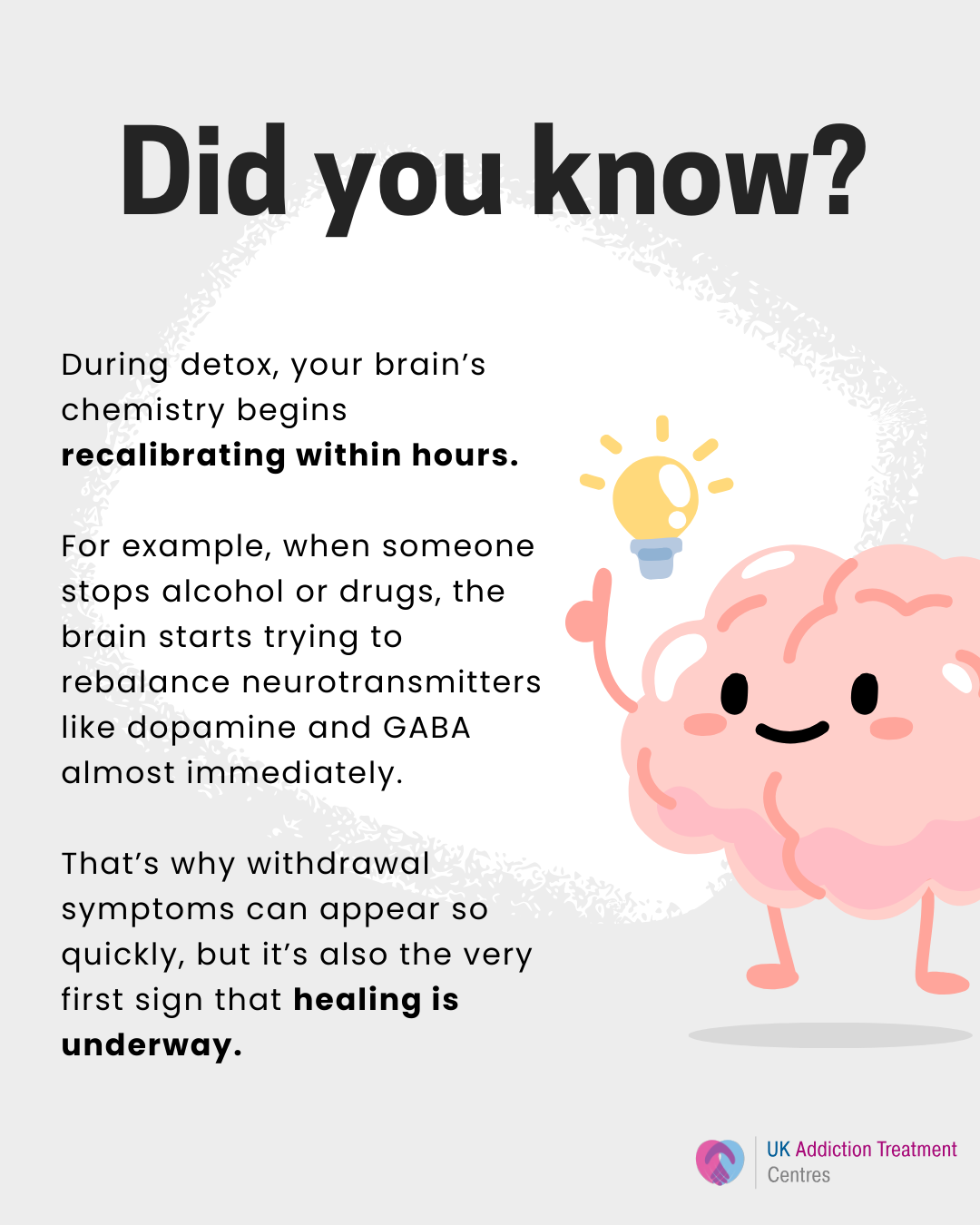
Written by:

Medically Reviewed by:
Last Updated:
October 13th, 2025
Detox
Detox is a crucial first step in your primary addiction treatment programme because it clears your system and allows you to start again, substance-free. At UKAT, we understand that this can be a tough process both physically and emotionally, but it is a necessary first step towards making a successful addiction recovery.
To ensure your personal safety, UKAT’s centres provide inpatient detox from alcohol and various illicit and prescription drugs. Our detox programmes have been designed and are observed by a medical professional to help manage withdrawal symptoms and other complications. The aim is to give you the smoothest, safest experience and set you up for the next stages of your recovery
This page will explain everything you need to know about alcohol and drug detox, the potential effects of withdrawal, and the support provided at UKAT’s detox centres.
What is detox?
“Detox” is short for “detoxification”, and it means removing addictive substances from your system. This is the first step in any effective recovery programme because it breaks your physical dependence on drugs and alcohol and kickstarts the healing process.
While giving up drugs and alcohol may seem straightforward enough, the reality is different and quitting a substance can be incredibly difficult. Everybody reacts differently to detox, but most people experience some degree of withdrawal symptoms. In many cases, these can become overwhelming and cause a relapse. In the most serious cases, they can be very dangerous and can even put your life in danger.
“Medical detox” is the term given to detoxing with medical professionals guiding the process. While it can be a scary prospect, medical detox is really nothing like attempting to quit on your own at home. With medical detox at a UKAT recovery centre, you will receive:
- On-arrival medical assessment and detox planning
- Round-the-clock observation and planning adjustments
- Support with proper nutrition and hydration
- Detox medication (if necessary and provided on a case-by-case basis)
- A direct route into a UKAT rehab therapy programme under the same roof
Who is detox beneficial for?
Detox is essential if you are living with an addiction to alcohol, drugs, or prescription medication. If you’ve tried to quit on your own before and found withdrawal too difficult, or if you have other medical conditions that could make stopping dangerous, a monitored detox gives you the safest start.
That said, detox isn’t only for people with full-blown addictions. If you are drinking heavily or using drugs regularly, it is always worth cutting down or quitting altogether. Even in these cases, it’s a good idea to have a friend, family member, or doctor involved, because withdrawal can still be tough and sometimes unpredictable. Whether you’re dependent or not, you don’t need to go through the process alone.
Where is the best place to undergo the detox process?
In our experience, the safest way to undergo detox is at an inpatient centre under the supervision of a medical professional. At one of our nine UKAT clinics, you will receive a full medical assessment so we can make a detox plan based on the results. This detox plan will be unique to you and will consider:
- Which substances you have been using (this could be a single substance, but may be multiple substances at the same time)
- How long you have been using them
- How much you have been using
- Your general physical health
- Co-occurring mental health and addiction issues, which may need extra care
- Whether you have attempted detox before
While your detox plan will lay out a blueprint, it can be adjusted at any time if necessary. Your detox team will watch you carefully and, if your needs change, the support provided can also change accordingly. This allows our team to proactively keep you safe and also react swiftly to anything that arises.
At UKAT centres, we provide inpatient detox as it is the safest and most effective way to detox. This has long been supported by scientific evidence, and we advise anybody who is looking to detox to do so with medical guidance.
If you absolutely cannot go to a rehab or detox centre, we urge you to consult your doctor so that they can best advise you on how to detox safely. While the NHS does provide detox services, these may be on an outpatient detox basis, which may not be safe or effective for you.
Detox programmes provided by UKAT
UKAT has multiple detox and rehab treatment centres across the country, providing different detox programmes for drugs and alcohol. For instance, our Primrose Lodge centre offers:
Each UKAT recovery centre provides different detox services, so check our centre pages or contact UKAT directly so we can match you with the best option.
Withdrawal symptoms during the detox process
Withdrawal symptoms are the uncomfortable, scary and sometimes dangerous reactions your body has to drugs or alcohol being removed. There is no definitive list of symptoms that you will experience because everyone reacts to withdrawal differently, and different substances produce different withdrawal symptoms.
Alcohol withdrawal symptoms
Most people who undergo alcohol detoxification will experience some degree of discomfort as their body readjusts to operating without alcohol. This is because using alcohol for a prolonged period of time causes your central nervous system to adapt to the effects of alcohol, so when intake is stopped or reduced considerably, alcohol withdrawal symptoms are triggered. These can include:
- Anxiety
- Irritability
- Agitation
- Dehydration
- Headaches
- Insomnia
- Nausea
- Rapid emotional changes
- Complete loss of appetite
- Tremors
- Sweating
- Fever
Unfortunately, while alcohol is the most consumed substance in Britain, its withdrawal symptoms can also be some of the most dangerous. The most severe alcohol withdrawal symptoms are called Delirium tremens (DTs), and it is a potentially life-threatening condition that occurs in about five per cent of people detoxing. DTs can include:
- Seizures
- Extreme confusion
- Profuse sweating and dehydration
- Extreme fever
- Dangerously high blood pressure and heart rate
- Hallucinations
- Stroke
- Heart attack
DTs are most common in those with a long history of heavy alcohol use and/or with other co-existing physical and mental health conditions. Thorough detox planning can help anticipate these complications, and alcohol detox medication can be given to lessen them. Crucially, if there is any risk of DTs, then you should never attempt alcohol detox at home because problems can escalate into an emergency incredibly quickly.
Drug withdrawal symptoms
Any addictive drug can lead to withdrawal symptoms upon cessation of use if you have become psychologically dependent on it. Drug withdrawal symptoms are not exclusive to illegal drug addiction, and stopping prescription medication can also produce incredibly distressing and even dangerous reactions. Drug withdrawal symptoms of drug detox can differ from person to person and substance to substance, but the most common symptoms include:
- Insomnia
- Paranoia
- Mood swings
- Depression
- Aggression
- Nightmares
- Nausea and vomiting
- Restlessness, agitation and irritability
- Muscle cramps and spasms
- Diarrhoea and other digestive problems
- Flulike symptoms, including fever, sore throat, and runny nose
- Sweating and shivering
- The early stages of psychosis
Mixing drugs, poor overall health, long-term drug use and attempting detox before can all increase the chances of severe withdrawal symptoms. However, as with alcohol, proper detox planning and medical oversight can greatly reduce the dangers associated with drug detox, whether you are withdrawing from illegal drugs or prescription medication.
The detox timeline
The length of the detox process can vary from person to person, as it is dependent on factors such as your health, the quantity of alcohol or drugs in your system, and whether you have any underlying medical conditions.
Alcohol detox timeline
With alcohol detox, it is likely that you will experience the peak of withdrawal during the first two to three days of your treatment due to your body’s chemical imbalance. You may experience the same kind of discomfort that comes with a hangover, with the third day usually seeing an improvement in hydration and mood as your blood sugar levels return to normal.
Your alcohol cravings should also begin to subside around this time because there will no longer be a chemical imbalance. Providing that you do not develop any serious health complications, most physical withdrawal symptoms should start to subside seven to ten days into detox. However, some anxiety, mood swings and other mental and emotional difficulties can continue for a few days or weeks.
Our bodies possess incredible powers of recovery, and after a month of abstinence from alcohol, you should see some seriously positive changes. The organ most affected by alcohol abuse is the liver, with long-term alcohol abuse potentially causing a chronic health condition like cirrhosis. However, your body will lose around 20% of the fatty deposits caused by drinking after only one month of sobriety, and you should soon see significant improvements in your energy levels, mental clarity and sleep.
Drug detox timeline
On average, physical drug withdrawal symptoms last between one and two weeks. However, this can take significantly longer in severe cases or with certain drugs like benzodiazepines, which can cause symptoms for months.
The reality is that drug withdrawal symptoms are not easy, which is why a detox at home is never recommended. However, with the right support, most physical drug withdrawal symptoms usually begin to decline by the second week.
Where the ongoing challenges arise is that, as with alcohol, psychological drug withdrawal symptoms can last a lot longer. This is a condition called post-acute withdrawal syndrome (PAWS), and it is why being able to move straight from inpatient detox into residential rehab therapy is so important.
At all UKAT centres, we will begin to introduce early therapy sessions as soon as your withdrawal symptoms are stable, so you can get ready for the deeper work that is coming.
Which detox medication will you be given?
This really depends on what you need, and no detox medication will ever be given without careful medical consideration. Some potential medications include:
- Sedative medications like benzodiazepines to reduce the risk of seizures and treat anxiety and insomnia
- Neuroleptic medications (antipsychotics) to stabilise your central nervous system and prevent muscle spasms
- Opioid replacements like methadone to help safely taper you off heroin and other dangerous drugs
Where can I receive inpatient detox?
Are you ready to begin recovery and build a new life free from drugs and alcohol? Then get in touch with UKAT today, and begin your journey on our comprehensive treatment pathway. Our inpatient detox programmes can help you overcome dependency, navigate withdrawal safely and prepare for the rehab therapy and aftercare stages. We have helped thousands of people just like you overcome addiction, and with your courage and motivation, there is a whole new life waiting for you. Contact us today to get started.









